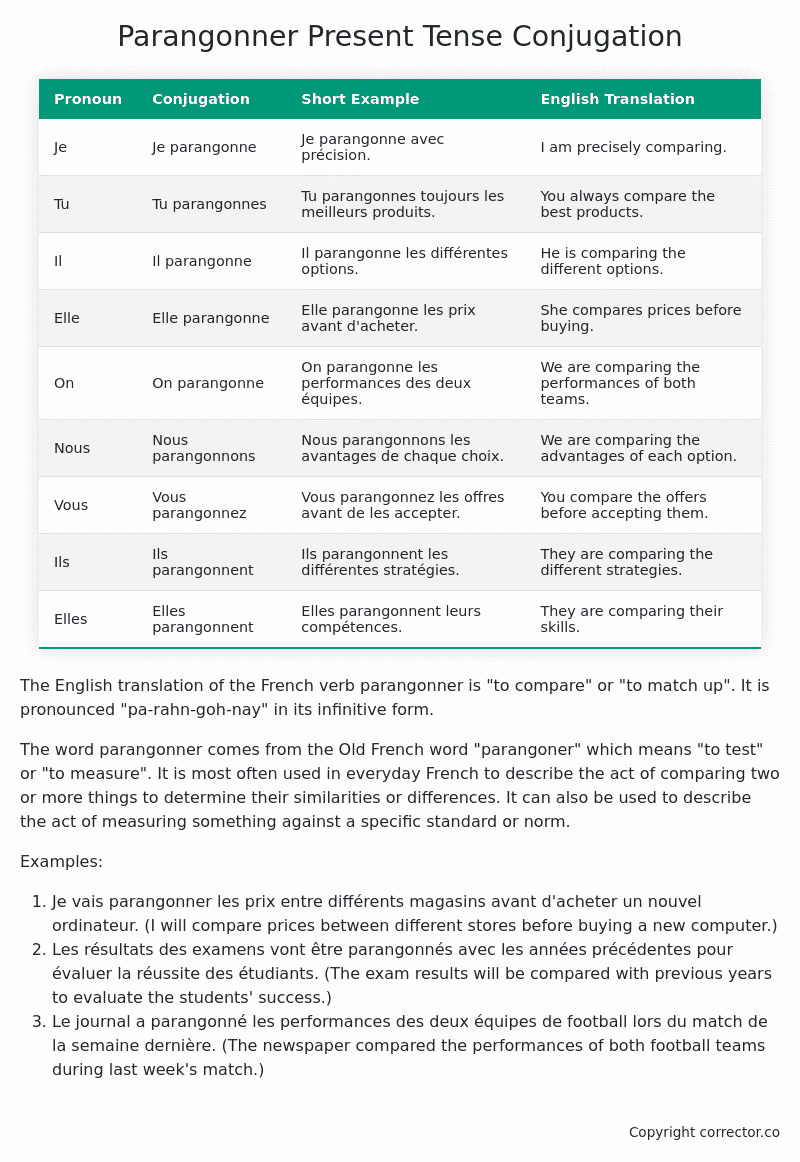Le Present (Present Tense) Conjugation of the French Verb parangonner
Introduction to the verb parangonner
The English translation of the French verb parangonner is “to compare” or “to match up”. It is pronounced “pa-rahn-goh-nay” in its infinitive form.
The word parangonner comes from the Old French word “parangoner” which means “to test” or “to measure”. It is most often used in everyday French to describe the act of comparing two or more things to determine their similarities or differences. It can also be used to describe the act of measuring something against a specific standard or norm.
Examples:
- Je vais parangonner les prix entre différents magasins avant d’acheter un nouvel ordinateur. (I will compare prices between different stores before buying a new computer.)
- Les résultats des examens vont être parangonnés avec les années précédentes pour évaluer la réussite des étudiants. (The exam results will be compared with previous years to evaluate the students’ success.)
- Le journal a parangonné les performances des deux équipes de football lors du match de la semaine dernière. (The newspaper compared the performances of both football teams during last week’s match.)
Parangonner – About the French Present Tense
To take a deep dive into all the French tenses then see our article on Mastering French Tense Conjugation.
Common Everyday Usage Patterns For Le Present
Interactions with Other Tenses
Table of the Present Tense Conjugation of parangonner
| Pronoun | Conjugation | Short Example | English Translation |
|---|---|---|---|
| Je | Je parangonne | Je parangonne avec précision. | I am precisely comparing. |
| Tu | Tu parangonnes | Tu parangonnes toujours les meilleurs produits. | You always compare the best products. |
| Il | Il parangonne | Il parangonne les différentes options. | He is comparing the different options. |
| Elle | Elle parangonne | Elle parangonne les prix avant d’acheter. | She compares prices before buying. |
| On | On parangonne | On parangonne les performances des deux équipes. | We are comparing the performances of both teams. |
| Nous | Nous parangonnons | Nous parangonnons les avantages de chaque choix. | We are comparing the advantages of each option. |
| Vous | Vous parangonnez | Vous parangonnez les offres avant de les accepter. | You compare the offers before accepting them. |
| Ils | Ils parangonnent | Ils parangonnent les différentes stratégies. | They are comparing the different strategies. |
| Elles | Elles parangonnent | Elles parangonnent leurs compétences. | They are comparing their skills. |
Other Conjugations for Parangonner.
Le Present (Present Tense) Conjugation of the French Verb parangonner (this article)
Imparfait (Imperfect) Tense Conjugation of the French Verb parangonner
Passé Simple (Simple Past) Tense Conjugation of the French Verb parangonner
Passé Composé (Present Perfect) Tense Conjugation of the French Verb parangonner
Futur Simple (Simple Future) Tense Conjugation of the French Verb parangonner
Futur Proche (Near Future) Tense Conjugation of the French Verb parangonner
Plus-que-parfait (Pluperfect) Tense Conjugation of the French Verb parangonner
Passé Antérieur (Past Anterior) Tense Conjugation of the French Verb parangonner
Futur Antérieur (Future Anterior) Tense Conjugation of the French Verb parangonner
Subjonctif Présent (Subjunctive Present) Tense Conjugation of the French Verb parangonner
Subjonctif Passé (Subjunctive Past) Tense Conjugation of the French Verb parangonner
Subjonctif Imparfait (Subjunctive Imperfect) Tense Conjugation of the French Verb parangonner
Conditionnel Présent (Conditional Present) Tense Conjugation of the French Verb parangonner
Conditionnel Passé (Conditional Past) Tense Conjugation of the French Verb parangonner
L’impératif Présent (Imperative Present) Tense Conjugation of the French Verb parangonner
L’infinitif Présent (Infinitive Present) Tense Conjugation of the French Verb parangonner
Struggling with French verbs or the language in general? Why not use our free French Grammar Checker – no registration required!
Get a FREE Download Study Sheet of this Conjugation 🔥
Simply right click the image below, click “save image” and get your free reference for the parangonner Present Tense tense conjugation!

I hope you enjoyed this article on the verb parangonner. Still in a learning mood? Check out another TOTALLY random French verb present conjugation!


